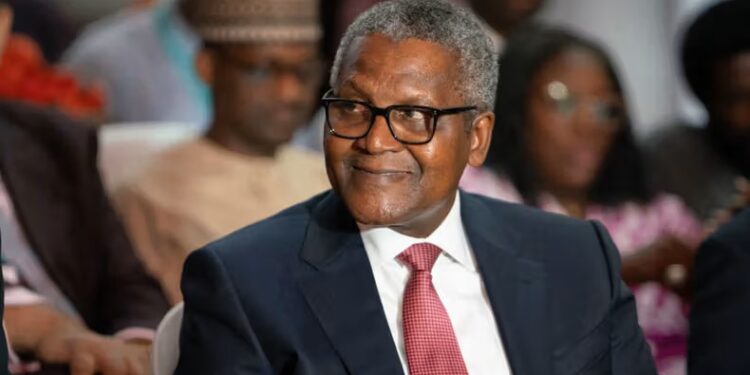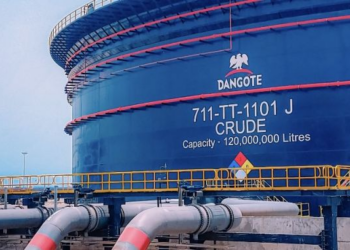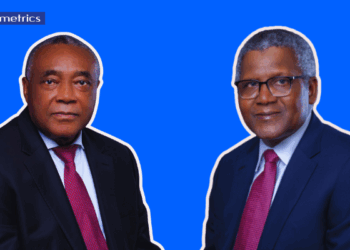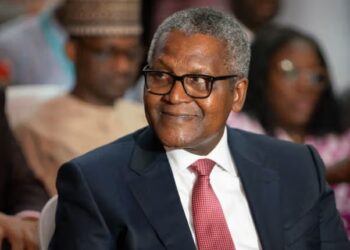Africa’s richest man and Chairman of Dangote Group, Aliko Dangote, has stated that the Nigerian economy will witness a more favourable exchange rate as market conditions continue to improve.
This was made known by Dangote during a visit by the Minister of Industry, Trade and Investment, Dr Jumoke Oduwole, to the $20 billion Dangote Petroleum Refinery & Petrochemicals and Dangote Fertiliser Limited in Ibeju-Lekki, Lagos, over the weekend.
Dangote explained that some measures adopted by the monetary authority alongside broader economic reforms were gradually stabilising the foreign exchange market and restoring predictability.
He admitted they are also beginning to see some stability in the naira-to-dollar exchange rate, which has had a positive impact.
Tinubu is a listening President
Dangote praised President Bola Tinubu for being a listening president whose policies are restoring investor confidence in Nigeria’s economy.
He commended President Tinubu’s efforts to address crude supply challenges to domestic refineries.
The industrialist praised the Naira-for-Crude initiative and the Nigeria First policy as bold and transformative steps capable of revitalising the economy.
He said, “I believe we must sincerely thank His Excellency, President Bola Ahmed Tinubu, for ensuring that there have been improvements in the supply of crude oil. His insistence that all crude oil transactions be conducted in naira has been particularly commendable. For us to effectively meet market demand—which we have the capacity to do—it is essential that crude is priced and purchased in our local currency.
He noted that these initiatives, along with other economic reforms, have brought a measure of stability to the naira-to-dollar exchange rate, expressing optimism that the naira would continue to strengthen in the coming weeks as the effects of the reforms become more visible.
Exchange rate stability
According to him, the improved market predictability has helped investors make sound business decisions and restored confidence in the investment climate.
He said, “We are also beginning to see some stability in the naira-to-dollar exchange rate, which has had a positive impact. There is now less fluctuation, and this has brought a degree of predictability to the market.
“For those of us in the business sector, this is a welcome development, as it allows us to plan more effectively. Looking ahead, as market conditions continue to improve, we can expect to see a more favourable exchange rate.”
Dangote also commended the Federal Government for establishing a One-Stop Shop (OSS) initiative to improve coordination among regulatory and security agencies, thereby facilitating smoother operations under the Naira-for-Crude programme.
He emphasised that the OSS had significantly reduced bottlenecks and allowed for real-time resolution of issues, in line with President Tinubu’s directive.
He said, “The administration of His Excellency, President Bola Ahmed Tinubu, has established a One-Stop Shop that is working diligently. I am confident that the government intends to replicate this model in other sectors, particularly to streamline the clearing of goods—an essential area of business.
“At present, we are not experiencing any significant issues with loading. All the relevant agencies have been brought together under one roof, including the Navy, NIMASA, NPA, and others. This coordination has greatly improved efficiency. Whenever issues arise, they are promptly addressed through the leadership of the Chairman of the Technical Committee, Mr Zack Adedeji, who is doing an excellent job.”
What you should know
Aliko Dangote had earlier asked President Bola Tinubu to ban the importation of refined petroleum products under the ‘Nigeria First’ policy of the Federal Government.
However, this was unanimously rejected by oil marketers and some industry analysts
The ’Nigeria First’ policy seeks to ban government agencies from importing goods that can be produced within Nigeria. In May, Tinubu barred government agencies from importing goods or services that are available locally.
According to him, the importation of fuel into Nigeria is killing local refining and discouraging further investments in the sector and even the economy.





















